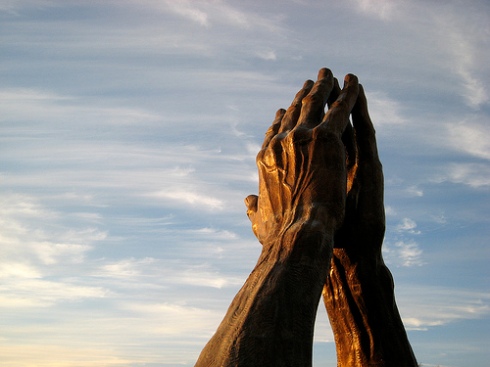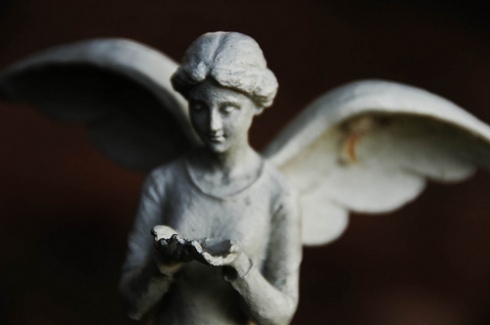Photo by C Jill Reed at Flickr.com
July 27, 2013
Sts. Clare & Francis ECC
17th Sunday in Ordinary Time
Genesis 18:20-32
Colossians 2:12-14
Luke 11:1-13
Homily by Frank Krebs
Tonight the gospel talks about prayer. Luke’s gospel puts a lot of emphasis on prayer and about followers of Jesus learning new skills. Jesus’ disciples ask, “Lord, teach us to pray.” What is the skill of prayer? Why did they want to learn to pray? They wanted to learn perhaps because they saw Jesus engaged in it and they liked what they saw. And it’s doubtful that Jesus was simply just saying the “Lord’s Prayer.” The Lord’s Prayer or the “Our Father” is a kind of summary of how to pray.
This is not to say that the prayer as we know it is not a good prayer in itself. Of course it is. It is perhaps the best known Christian prayer and has been included in the Eucharist apparently since the first century[i]. Rote prayers have their place in our spiritual lives. Sometimes we’re not sure what to say and we can fall back on these words knowing that we are using very precious words, apparently shaped by the unique spirituality of Jesus himself. I have experienced many people when they are nearly unconscious still able to say these words which they learned as a child. There is a deep beauty in that.
However the prayer itself is a kind of summary prayer that points to what the Master would teach his pupils:
The Intimacy of Prayer (Abba)
Time spent consciously with God is so intimate for Jesus that he calls his God by the tender, childlike term “abba” or Daddy. Words spoken here are spoken in total security and trust. I can say anything and fear nothing. Often the audience affects how we say certain things; with God we learn a certain authenticity that comes from being totally known and loved at the same time.
The Otherness of God (Your Name is holy.)
The most special moment of prayer for me is when there is a kind of in-breaking, where I sense a kind of moving presence of the Other. This is the goal of prayer. It is time to stop and rest in timelessness. It is the embrace of God. Here we learn to respect the other as truly the other, the one who comes to us on God’s own terms. Respect and awe grow from this experience.
The Importance Of Hope (Your Kingdom Come)
We live in hope. This is a palpable experience, no? Have you ever been discouraged and witnessed hope rising up within you? It is an awesome gift. Traditionally it is refered to as a “theological virtue” because it has always been recognized as something divine that is operating within us when it happens. To be in communion with God (i.e., consciously conversing and/or being mutually present to each other as in an embrace) is to open the door to hope. It arises. It’s like a wind against our sail. Hope is a kind of energy food that strengthens us to keep moving forward and to want to keep moving.
The Dependency We Experience (Give us, Forgive us, Lead us)
The most basic experience of God is as our source. Perhaps an analogy would be this. Imagine an electric fan plugged into the wall and functioning with a flow of electricity. Now imagine the fan being conscious that it was operating because it was plugged into an electrical source. It’s something like that. However of course it’s deeper. Unfortunately our own privileged lives make it difficult to imagine our dependence on God without effort. The underprivileged, the marginalized, the sick, etc. have “Lord, have mercy” on their lips all day long. To feel desperate can be a gift if it unmasks our privilege so that our true dependence can be appreciated; and this unmasking can open us up to those around us who are desperate. In this wordless lecture of the embrace of God, God teaches us to trust in all circumstances and to see in every creature the sign of God’s presence and to see those who suffer through God’s own eyes.
So it may be that Jesus is teaching us, his students, to pray; but our experience of prayer is teaching us how to live: to be intimate and respectful and hopeful and consciously plugged into the Giver of all life.
[i] It is found in an ancient Christian text, which includes the Eucharist, called the Didache. And by the way that is where we get the ending so familiar to Protestants but not restored to the Catholic Eucharist until Vatican II: “For yours is the kingdom, the power and the glory, now and forever.” Funny how that became something to fight over for centuries!




